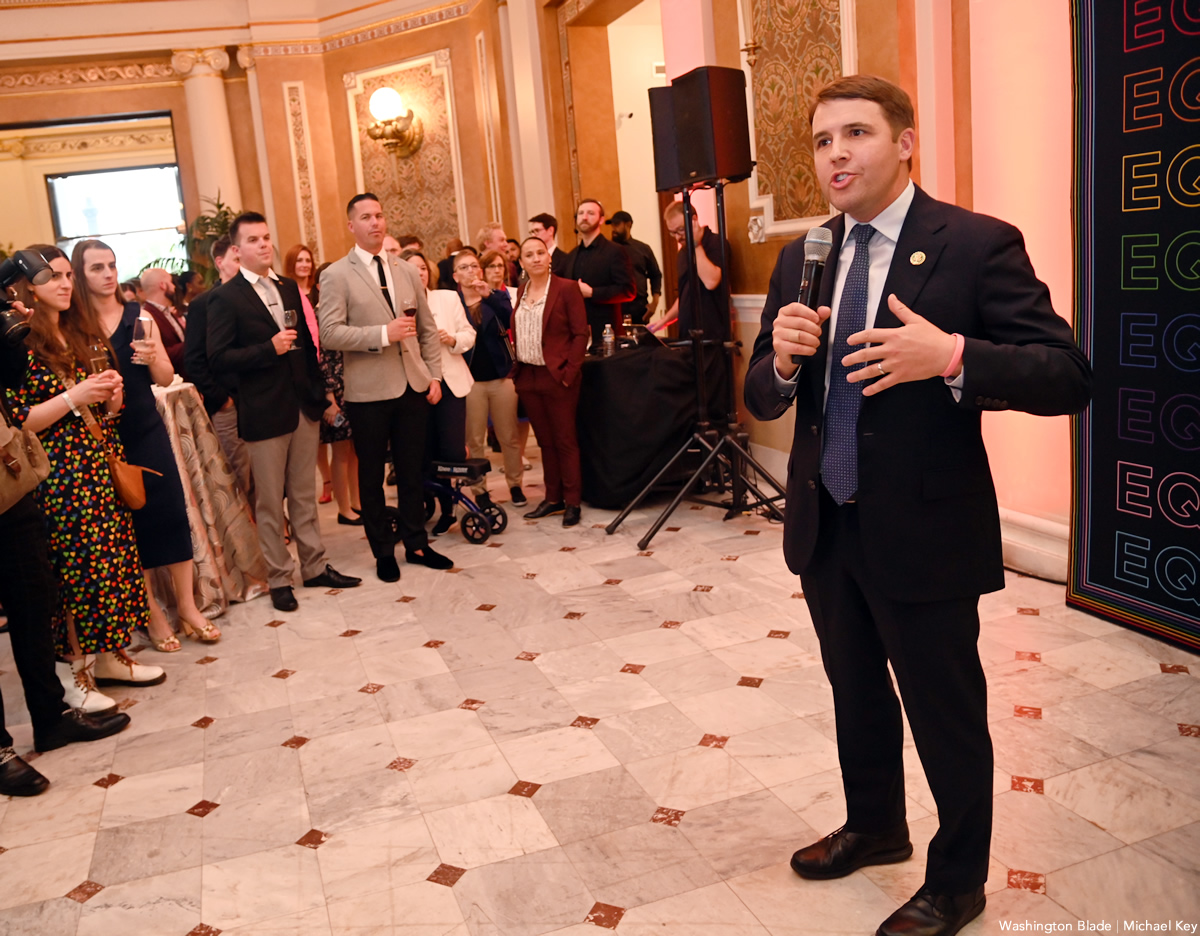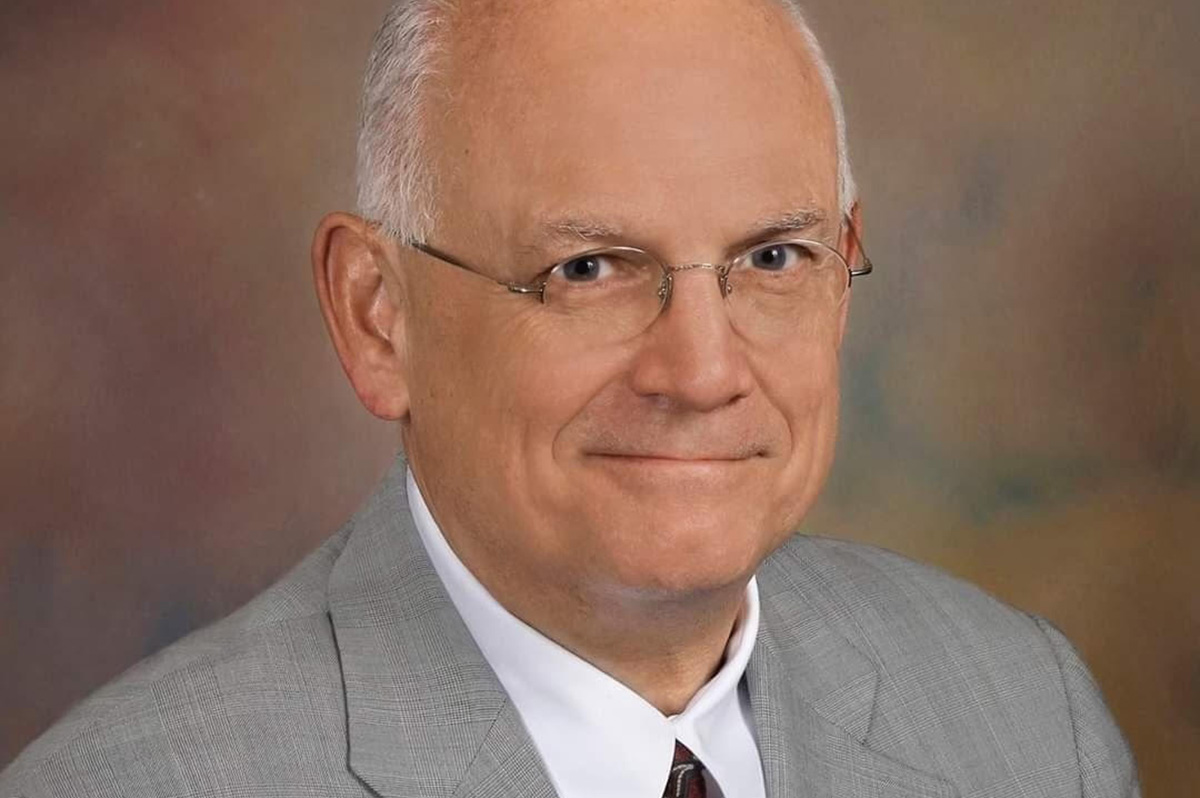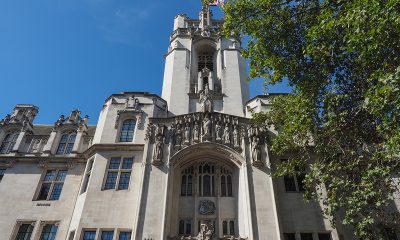News
Chilean Senate committee approves civil unions bill
LGBT advocates describe vote as ‘step forward’


A Chilean Senate committee on Tuesday unanimously approved a civil unions bill. (Photo by the Photographic Collection of the Library of the National Congress of Chile; courtesy Wikimedia Commons)
The vote sets the stage for a potential vote on the measure in the full Senate.
“Today we have taken a step forward in this fight for civil unions that we began a decade ago,” said the Movement for Homosexual Integration and Liberation, a Chilean LGBT advocacy group, in a statement. “The step that was once a dream is becoming real.”
Luis Larraín, president of Fundación Iguales, another Chilean LGBT advocacy group, also applauded the vote.
“We are one step closer to the state of Chile recognizing that there are distinct types of family and that all of them deserve protection,” he said.
Former President Sebastián Piñera first introduced the civil unions bill in the Chilean Congress in 2011.
Senators in January voted 28-6 to move the proposal out of committee.
President Michelle Bachelet, who took office in March, publicly backed marriage rights for same-sex couples in the South American country during last year’s presidential campaign.
Chile’s highest court in 2011 ruled the country’s ban on nuptials for gays and lesbians is constitutional in a case the Movement for Homosexual Integration and Liberation filed on behalf of three same-sex couples who are seeking marriage rights.
The Piñera administration argued in a brief it filed with the Inter-American Court of Human Rights last November in response to the same-sex marriage lawsuit that the plaintiffs have “not exhausted domestic remedies to obtain the nullification of the administrative act for [the] alleged violation of fundamental rights.” Lawyers representing the three couples have repeatedly urged Bachelet to reject her predecessor’s position in the case.
Anti-LGBT violence casts shadow over advances
LGBT rights advocates have seen a number of legal and political advances in the conservative South American country in recent years.
Piñera in 2012 signed an LGBT-inclusive hate crimes and anti-discrimination bill that had languished in the Chilean Congress for seven years. It is named in honor of Daniel Zamudio, a 24-year-old man whom a group of self-described neo-Nazis beat to death inside a park in Santiago, the country’s capital, earlier that year.
The country’s Senate in January advanced a bill that would allow trans Chileans to legally change their name and sex without sex reassignment surgery.
The Inter-American Court of Human Rights in 2012 ruled in favor of Karen Atala, a lesbian judge who lost custody of her three daughters to her ex-husband seven years earlier because of her sexual orientation.
Claudio Arriagada last November became the first openly gay person elected to the Chilean Congress.
Jaime Parada Hoyl, a former spokesperson for the Movement of Homosexual Integration and Liberation, in 2012 won a seat on the municipal council in Providencia, a wealthy Santiago enclave.
Voters in the Santiago suburb of Lampa re-elected transgender Councilwoman Alejandra González during the same municipal elections. Trans activist Zuliana Araya also won a seat on the Municipal Council in the coastal city of Valparaíso.
Anti-LGBT violence remains a serious concern in spite of these political and legal advances.
The Movement for Homosexual Integration and Liberation said in a press release on Tuesday that Zaconi Orellana Acevedo, a 22-year-old trans woman, was killed earlier this week in a town outside of Santiago.
“We cannot forget that the female transsexual population is particularly vulnerable, because from an early age all doors are closed for them and a great many of them are forced to engage in commercial sex work to survive,” said the advocacy group. “The lack of a gender identity law that would allow trans people to change their name with a simple process in the Civil Registry and not in the judiciary as occurs right now, would bring more development possibilities to this social group.”
A rash of other anti-LGBT attacks over the past year have sparked outrage among Chilean advocates. These include the death of Esteban Parada Armijo in January after two men stabbed him in Santiago’s Bellavista neighborhood where several gay bars and clubs are located.
Guillermo Aguilera Guerrero allegedly stabbed Alejandro Alfredo Bustamante Godoy to death inside his Valparaíso home a few weeks before Parada’s murder.
Bachelet has said she supports efforts to strengthen Chile’s hate crimes and anti-discrimination law.
District of Columbia
Gay Men’s Chorus of Washington to celebrate Spring Affair honorees
‘Their work inspires our music and deepens our mission’

For 44 years, the Gay Men’s Chorus of Washington (GMCW) has served as a powerful voice for love, unity, and pride among Washington’s LGBTQ community and its allies. Since its first performance in 1981—at the opening of the National Gay Task Force’s Washington office (later becoming the National LGBTQ Task Force)—GMCW has built a politically engaged and culturally significant legacy as one of the nation’s foremost LGBTQ performing arts organizations.
As its music and mission evolved, GMCW deepened its involvement in supporting LGBTQ individuals and allies alike. In 2004, the chorus launched its first Spring Affair fundraiser. This annual event not only generates financial support for the inclusive choral group, but also honors individuals and organizations in the Washington community who exemplify GMCW’s mission of unity, equity, and empowerment through music.
Each year at the Spring Affair gala, the chorus honors one community leader, one external organization, and one GMCW member. For the 2025 gala, GMCW will recognize Bishop Mariann Edgar Budde, Atlas Performing Arts Center, and GMCW member Keygan Miller.
“These honorees remind us why we sing,” said Thea Kano, artistic director of the Gay Men’s Chorus of Washington, DC, in an email. “In moments when our community has needed strength, they’ve offered hope. Whether it’s a brave voice from the pulpit, a tireless advocate for our youth, or an organization that opens its doors to every story—each has chosen to lead with love, truth, and courage. Their work inspires our music and deepens our mission.”
GMCW will honor Bishop Mariann Edgar Budde, the first woman elected to lead the Episcopal Diocese of Washington, as its 2025 individual award recipient. A longtime champion of equity and inclusion, Bishop Budde gained national prominence during the Inaugural Prayer Service at Washington National Cathedral, where she spoke directly to newly sworn-in President Donald Trump.
“Have mercy, Mr. President,” she implored, lifting the hopes of the most vulnerable Americans targeted by Trump’s policies—particularly LGBTQ and immigrant communities. Her bold words signaled to the nation that she remains a genuine and outspoken voice for justice, unity, and truth, inspiring compassion and faith within and beyond her religious community.
GMCW will present the Harmony Award for an Organization to the Atlas Performing Arts Center, located in the historic H Street, N.E. corridor. In 2024 alone, Atlas hosted more than 400 events and provided $1.6 million in free and discounted tickets, arts education, community programming, and space use. Through this work, Atlas has amplified “artistic voices that reflect the full diversity of our community.”
The center has long partnered with GMCW, offering space for open mic nights, cabarets, GenOUT Chorus events like the Youth Summit, and even memorial services such as that for Bobby T. Boaz. Atlas exemplifies GMCW’s mission of storytelling, equity, and civic connection through programs like the INTERSECTIONS Festival and City at Peace.
“We are absolutely thrilled and deeply honored that the Atlas Performing Arts Center has been named a recipient of the GMCW Harmony Award! This recognition is a powerful affirmation of our commitment to uplifting voices, fostering inclusive creative expression, and building a space where everyone feels seen, heard, and celebrated,” said Jarrod Bennett, Executive Director of the Atlas Performing Arts Center.
“At the Atlas, our mission is rooted in the belief that the arts are for everyone—and that through performance, dialogue, and community, we can help shape a more just, compassionate world. To be acknowledged by the Gay Men’s Chorus of Washington, DC—an organization that has long stood at the forefront of championing equality and advancing the well-being of the LGBTQ+ community—is a profound and humbling honor. We continue to be inspired by GMCW’s work and are proud to stand alongside them in this shared vision. Thank you, GMCW, for this beautiful recognition. We carry it forward with gratitude and renewed energy for the work ahead.”
Finally, GMCW will honor Keygan Miller, a chorus member since 2017, for their leadership, advocacy, and commitment to equity both onstage and off. Within GMCW, Miller served as Vice President of Diversity and Inclusion, led conversations to expand trans inclusion, authored the “Day One” pledge, and played a critical role in shaping inclusive programming.
Outside the chorus, Miller serves as Director of Public Training for The Trevor Project, a national nonprofit focused on crisis intervention and suicide prevention services for LGBTQ youth under 25. They previously worked as an Advocacy Manager at the Trevor Project, where they championed policies protecting LGBTQ+ youth at every level of government.
As GMCW continues its mission to uplift and unite through music, the organization encourages new voices to join its ranks. GMCW welcomes all singers—regardless of gender identity or sexual orientation—who can sing in the lower vocal registers.
The 2025 Spring Affair Gala will take place on May 17, 2025, at The Ritz-Carlton, Washington, D.C. This annual benefit supports GMCW’s artistic and educational programming. For tickets, audition information, and more, visit GMCW.org.
Congress
Goodlander endorses Pappas’s Senate bid
Announcement puts gay congressman on the path to securing his party’s nomination

U.S. Rep. Maggie Goodlander (D-N.H.) on Thursday announced she will not run to represent her state in the U.S. Senate, endorsing gay U.S. Rep. Chris Pappas’s (D-N.H.) bid for the seat of retiring U.S. Sen. Jeanne Shaheen, putting him on the path to secure the Democratic nomination.
“We are in the fight of our lifetimes right now, of a moment of real crisis and challenge,” she said. “I feel humbled and grateful to so many people across our state who have encouraged me to take a look at the U.S. Senate, and after a lot of thought and conversations with people I love and people I respect and people who I had never met before, who I work for in this role right now, I’ve decided that I’m running for re election in the House of Representatives.”
When asked by a reporter from the ABC affiliate station in New Hampshire whether she would endorse Pappas, Goodlander said, “Yes. Chris Pappas has been amazing partner to me in this work and for many years. And I really admire him. I have a lot of confidence in him.”
She continued, “He and I come to this work, I think with a similar set of values, we also have really similar family stories. Our families both came to New Hampshire over 100 years ago from the very same part of northern Greece. And the values that he brings to this work are ones that that I really, really admire. So I’m proud to support him, and I’m really excited to be working with him right now because we’ve got a lot of work to do.”
Today in Salem @MaggieG603 tells @WMUR9 she is not running for U.S. Senate & endorses @ChrisPappasNH #NHPolitics #NHSen #NH02 #WMUR pic.twitter.com/W2CMrhRuIC
— Adam Sexton (@AdamSextonWMUR) April 17, 2025
“Maggie Goodlander has dedicated her career to service, and we can always count on her to stand up to powerful interests and put people first,” Pappas said in a post on X. “I’m so grateful to call her my friend and teammate, and I’m proud to support her re-election and stand with her in the fights ahead.”
Earlier this month, former New Hampshire Gov. Chris Sununu, a Republican, announced he would not enter the Senate race, strengthening the odds that Democrats will retain control of Shaheen’s seat.
Obituary
Local attorney, LGBTQ rights advocate Dale Sanders dies at 75
Acclaimed lawyer credited with advancing legal rights for people with HIV/AIDS

Dale Edwin Sanders, an attorney who practiced law in D.C. and Northern Virginia for more than 40 years and is credited with playing a key role in providing legal services for people living with HIV/AIDS beginning in the early 1980s, died April 10 at the age of 75.
His brother, Wade Sanders, said the cause of death was a heart attack that occurred at Johns Hopkins Hospital in Baltimore shortly after he had back surgery.
Wade Sanders described his brother as a “trial lawyer, passionate criminal defense, and civil litigator for human rights” for close to 50 years, with some of his work focused on “civil law, notably gay-related insurance discrimination during the AIDS epidemic.”
He called his brother “a zealous advocate for the oppressed, his clients, and his personal convictions.”
Born in Arlington, Va., and raised in McLean, Va., Dale Sanders graduated from Langley High School in McLean and received his bachelor’s degree from the University of Virginia, his brother said. He received his law degree from D.C.’s American University Washington College of Law and began his law practice in 1976 in Old Town, Alexandria, Wade Sanders said.
Amy Nelson, director of Legal Services for D.C. ‘s Whitman-Walker Health, said Sanders became one of Whitman-Walker’s original volunteer pro-bono attorneys in the 1980s.
“Dale was a beloved part of the legal services program and our medical-legal partnership for nearly 40 years,” Nelson said. “Dale was one of the clinic’s first volunteer attorneys at Whitman-Walker’s weekly, legal walk-in clinic offering free counseling to clients about their legal rights in the face of HIV/AIDS and LGBT discrimination from employers, landlords, medical providers, and insurance companies,” according to Nelson.
Nelson added, “Dale represented dozens of people impacted by the ignorance and prejudice attendant to an HIV/AIDS diagnosis, and his litigation wins were instrumental in advancing the legal rights of persons living with HIV/AIDS.”
Sanders’s most recent case on behalf of Whitman-Walker took place in 2023 in support of a transgender woman in Virginia who faced discrimination from her employer and health insurer, Nelson said.
In 1989, Whitman-Walker presented Sanders with its Gene Frey Award for Volunteer Service, and in 1994 presented him with its Founders Award for Pro Bono Legal Services, Nelson told the Blade. She said in 2024, Whitman-Walker re-named its annual Going the Extra Mile Pro Bono Award as the Dale Sanders Award for Pro Bono Excellence.
“Dale’s legacy helped to shape HIV/AIDS law, and his fierce commitment to justice will live on at Whitman-Walker Health,” Nelson said in a statement. “We will miss him dearly.”
Daniel Bruner, who served as Whitman-Walker’s legal services director prior to Amy Nelson taking that position, said Sanders played a role in shaping his own legal skills and knowledge.
“Dale was one of my earliest legal models among local, and national, advocates for people living with HIV and LGBT people,” Bruner told the Blade. “He was a fierce, persistent advocate for his clients and for the community,” Bruner said, adding, “He won key victories in several cases where employees’ or health care patients’ privacy had been egregiously violated. I certainly will never forget him.”
Wade Sanders said his brother was also an avid bridge player, saying he played competitively. “He earned the rank of Ruby Life Master, a pretty big deal in the bridge world,” Wade Sanders said.
Dale Sanders is survived by his husband, Christian Samonte; his sister, Joyce Sanders of York, S.C.; his brother Wade Sanders of West Jefferson, N.C.; and his beloved dogs Langley and Abigail, his brother said in a statement.
A memorial service for Dale Sanders organized by the Sanders family and the LGBTQ Catholic group Dignity Washington will be held Saturday, May 10, at 1 p.m. at St. Margaret’s Episcopal Church at 1830 Connecticut Ave., N.W. in D.C., a Dignity Washington spokesperson said.
-

 District of Columbia5 days ago
District of Columbia5 days agoFinal push to raise funds, fill D.C. hotels as WorldPride nears
-

 El Salvador3 days ago
El Salvador3 days agoGay Venezuelan makeup artist remains in El Salvador mega prison
-

 District of Columbia4 days ago
District of Columbia4 days agoReenactment of 1965 gay rights protest at White House set for April 17
-

 Maryland5 days ago
Maryland5 days agoFreeState Justice: Transgender activist ‘hijacked’ Moore’s Transgender Day of Visibility event











